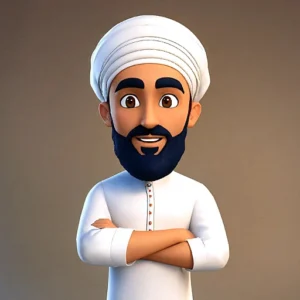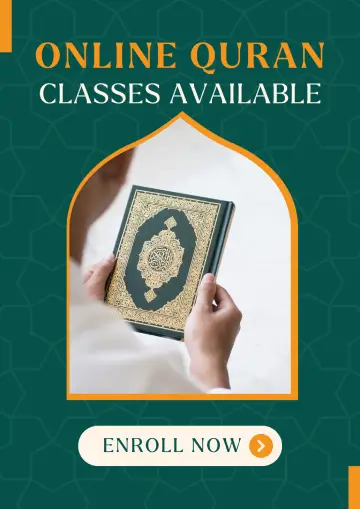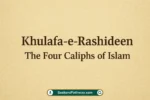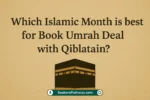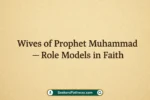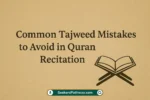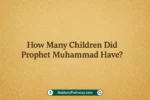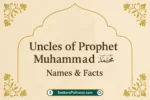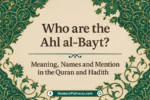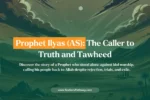The last messenger of Allah, Prophet Muhammad (ﷺ), the best of prophets, was sent to all of mankind, not just a tribe or a nation. He was the Seal of the Prophets (Khatam an-Nabiyyin), whose life became the living embodiment of the Qur’an.
Born an orphan in Makkah, raised in modesty, showered with honor by truthfulness and selected to carry the greatest message, his way of life is a model of faith and patience, mercy, and justice. Allah says:
“And We have not sent you, [O Muhammad], except as a mercy to the worlds.”
(Surah Al-Anbiya 21:107)
Birth and Early Life: Light in the Darkest Land
Prophet Muhammad (ﷺ) was born in the tribe of Quraysh, in the city of Makkah, in the year 570 CE and during the age known as Jāhiliyyah (the Age of Ignorance).
- His father, Abdullah, had died before he was born.
- At age six, his mother Aminah died.
- He was raised by his grandfather, Abdul Muttalib, then by his uncle Abu Talib.
Despite being orphaned, Allah nurtured him with care and guidance:
“Did He not find you an orphan and give [you] refuge?”
(Surah Ad-Duhaa 93:6)
As a young man, his nickname was Al-Ameen (The Trustworthy) for the honesty and integrity he showed. He became a merchant and married Khadijah (RA), a wealthy and respected member of his society who would go on to be his first supporter in prophethood.
The First Revelation: A Call to Prophethood
At 40 years old, during meditation in the mountain cave of Hira, angel Jibreel (AS) descended, and Almighty Allah revealed the first verse:
“Read in the name of your Lord who created.”
(Surah Al-‘Alaq 96:1)
This was the dawn of the last and very comprehensive guidance for humanity, the Qur’an.
Initially afraid, he was calmed down by Khadijah (RA), who took him to a Christian scholar named Waraqah ibn Nawfal, who confirmed his Prophethood.
“Indeed, We have sent to you a Messenger as a witness upon you just as We sent to Pharaoh a messenger.”
(Surah Al-Muzzammil 73:15)
The Makkan Period: 13 Years of Dawah and Patience
In Makkah, the Prophet Muhammad (ﷺ) preached to people for thirteen years, inviting them to:
- Tawheed (Oneness of Allah).
- Justice, honesty, and compassion.
- Rejection of idol worship, oppression, and immorality.
His message was met with:
- Mockery and rejection by the Quraysh.
- Physical attacks, boycotts, and abandonment by his supporters.
- Deaths of Khadijah (RA) and Abu Talib, Year of Sorrow (`Aam al-Huzn).
Allah reminded him:
“And be patient over what they say and avoid them with gracious avoidance.”
(Surah Al-Muzzammil 73:10)
Al-Isra’ wal-Mi‘raj: The Night Journey and Ascension
Among the greatest miracles, Allah sent His Messenger(ﷺ) on a miraculous journey:
- From the Masjid al-Haram (in Makkah) to the Masjid al-Aqsa (in Jerusalem).
- Then to the heavens, and met prior prophets.
- The five daily prayers were gifted.
“Exalted is He who took His Servant by night from al-Masjid al-Haram to al-Masjid al-Aqsa…”
(Surah Al-Isra 17:1)
Migration to Madinah: A New Chapter of Light
Faced with increasing persecution, the Prophet (ﷺ) and his companions emigrated to Madinah (then Yathrib), and this event is known as Hijrah and also started the Islamic calendar.
In Madinah:
- He was greeted by the Ansar (Helpers).
- Founded the first Islamic state.
- Proposed the Constitution of Madinah, granting rights to Muslims, Jews, and others.
- Constructed Masjid an-Nabawi as the new Muslim community’s district center.
“And those who have believed, emigrated and fought in the cause of Allah…it is they who are the truthful.”
(Surah Al-Hashr 59:8)

Battles and Trials: Defending the Message
The Prophet (ﷺ) fought a number of battles for the defense of Islam:
Battle of Badr (2 AH)
- The miraculous victory against the Quraysh.
- 300 Muslims kill 1000 enemies.
- Allah aided the believers with angels:
“And Allah had already given you victory at Badr while you were few in number…”
(Surah Aal-e-Imran 3:123)
Battle of Uhud (3 AH)
- A punishment for (temporary) disobedience.
- Injuries to the Prophet (ﷺ) and the martyrdom of many companions.
“So do not weaken and do not grieve, and you will be superior if you are [true] believers.”
(Surah Aal-e-Imran 3:139)
Battle of the Trench (5 AH)
- A deliberate victory through unity and commitment
Treaty of Hudaybiyyah and the Conquest of Makkah
Treaty of Hudaybiyyah in 6AH, A Treaty with Quraysh, which paved the way for peaceful da’wah. Eventually:
- In 8AH, Prophet Muhammad (ﷺ) entered Makkah peacefully in humility.
- He granted his enemies forgiveness, revealing unparalleled mercy.
“When the victory of Allah has come and the conquest…”
(Surah An-Nasr 110:1)
Final Years and The Farewell Pilgrimage
The Prophet (ﷺ) performed his Farewell Hajj in 10 AH, and he delivered his Farewell Sermon during which he summarized the essence of what he preached:
- The right to life, property, and honor.
- All human beings are equal, “no Arab is superior to a non-Arab.
- Women’s rights.
- Holding firmly to the Qur’an and Sunnah.
He declared:
“This day I have perfected for you your religion and completed My favor upon you and have approved for you Islam as your religion.”
(Surah Al-Ma’idah 5:3)
The Return to His Lord
On the 12th of Rabi al Awwal 11 AH, the beloved Prophet (ﷺ) left this world after a brief period of sickness, in the house of his wife A’ishah (RA), and went back to the presence of his Lord.
Madinah mourned, and the city was in grief. Abu Bakr (RA) got up and addressed the people:
“Whoever worships Muhammad — know that Muhammad is dead. But whoever worships Allah — know that Allah is Ever-Living and never dies.”
His mission was complete. The final Prophet, the last guide, and the mercy to all the worlds, he had completed his divine mission.
Lessons from the Life of Prophet Muhammad (ﷺ)
- Rejection requires patience, persistence.
- Mercy even toward enemies.
- Fairness, parity, and empathy.
- Strong firm belief in Allah in hardship and ease.
- Universal responsibility of the message, for all of humanity.
Conclusion
Prophet Muhammad (ﷺ) brought light to darkness, unity to division,n and hope to despair. He was a prophet, a leader, a father, a husband, but most importantly, he was the best of creation.
“Indeed, in the Messenger of Allah you have an excellent example for whoever has hope in Allah and the Last Day and remembers Allah often.”
(Surah Al-Ahzab 33:21)
May endless peace and blessings be upon Muhammad ibn Abdullah (ﷺ), the Final Messenger, the Seal of the Prophets, and the Light of Guidance for all creation. Aameen.

